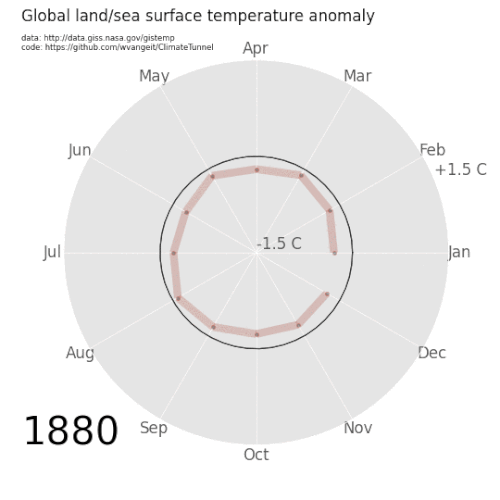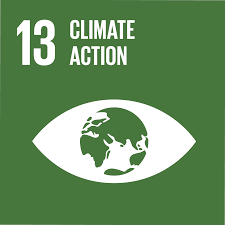Climate change strong evidence needs strong action
Polar plot of global mean monthly temperature anomaly (land and sea surface) for the period 1880-present.
The black circle represents 0 anomaly, center and circumference of plotting area represent -/+ 1.5 degrees Celsius anomalies respectively.
All data obtained from GISS Surface Temperature Analysis website. This visual was created by Werner Van Geit, EPFL.
Polar plot of global sea ice area (land and sea surface) for the period 1978-present.
Center and circumference of plotting area represent 12 - 24 million km2 respectively.
All data obtained from ArctischePinguin, raw file. This visual was created by Werner Van Geit, EPFL.
The 6th IPCC Assessment Report
Will it finally trigger policy action?
Mat Collins
Professor of Climate Change,
University of Exeter, UK
Field Chief Editor
Frontiers in Climate
Human-induced climate change is now one of the world’s leading challenges, an issue that threads through many of the United Nations Sustainable Development Goals (UNSDGs). The emergence of climate change as a global geopolitical issue has principally been due to the work of scientists, who have patiently gathered evidence from long-term measurements and produced theories and, later, numerical models of the climate system. This Frontiers evidence snapshot represents just the tip of the iceberg (sorry for the bad pun) of the many studies of climate change that have seen climate change transition from a scientific curiosity to a global environmental, socioeconomic, political, and technological grand challenge. While such a large-scale modification of our planet is far from the pinnacle of human achievement, its diagnosis (and ultimately its cure) is surely a leading example of an evidence-based scientific approach.
Evidence for the physical reality
of climate change: a literature survey
Welcome to our collection of scientific evidence of how climate change is impacting our planet in five crucial ways: the atmosphere, the ocean, the cryosphere, sea levels, and extreme events. Explore each table in full screen and scroll to the right to find a summary of the studies as well as links to the original articles. This unique resource includes over 352 studies from around the globe produced since 2015
Atmosphere
Cryosphere
Extreme events
Ocean
Sea levels
To generate this dataset, the Frontiers team searched Google Scholar for journal articles and technical reports describing physical evidence for the reality of climate change. The survey focused on five key themes in climate change studies, as identified by the IPCC Synthesis Report of 2014 , namely: the atmosphere, the ocean, the cryosphere, sea levels, and extreme events. Studies of the cause and impact of climate change and likely future developments were excluded from the survey. The search, conducted between March 1, 2021 and March 31 2021, used a set of pre-specified queries for each theme. The team downloaded all journal articles and technical reports, dated 2015 or later, reporting physical evidence for climate change relevant to one of the key themes targeted by the survey. The survey of climate studies was conceived and led by Richard Walker, with the collaboration of Cho Enriquez, Patricia Ilagan, Joseph Rasalan, and Nathan Afalla.
Commentary
The 6th IPCC Assessment Report: will it finally trigger policy action?
Mat Collins, Professor of Climate Change, University of Exeter, UK
Field Chief Editor, Frontiers in Climate
Human-induced climate change is now one of the world’s leading challenges, an issue that threads through many of the United Nations Sustainable Development Goals (UNSDGs). The emergence of climate change as a global geopolitical issue has principally been due to the work of scientists, who have patiently gathered evidence from long-term measurements and produced theories and, later, numerical models of the climate system. This Frontiers evidence snapshot represents just the tip of the iceberg (sorry for the bad pun) of the many studies of climate change that have seen climate change transition from a scientific curiosity to a global environmental, socioeconomic, political, and technological grand challenge. While such a large-scale modification of our planet is far from the pinnacle of human achievement, its diagnosis (and ultimately its cure) is surely a leading example of an evidence-based scientific approach.
Global and national assessments of the literature on climate change have been the main tools by which scientific research has been translated into information for policymakers. The 5th Assessment Report (AR5) of the Intergovernmental Panel on Climate Change (IPCC) involved 829 authors from over 80 countries. The Working Group I report on the Physical Science basis cited over 9,000 studies alone (IPCC, 2013). The crucial feature of IPCC reports is that they synthesise the literature and present it in a policy relevant but not policy prescriptive way; they are informative but are not instructions.
Despite their relatively technical presentation (some would argue), IPCC reports have been pivotal in driving interest in climate change among politicians and the public. They have informed policy discussions, such as those which are part of the United Nations Framework Convention on Climate Change and their regular series of Conference of the Parties (COP) meetings. The reports have even spawned viral internet GIFs such as the ‘climate spiral’ seen here, first produced by my colleague Ed Hawkins from the University of Reading and used during the opening ceremony of the Rio Olympics.
The preparation of the 6th Assessment report of the IPCC is now well underway and publication is expected later in 2021. I was involved in writing a chapter of the AR5 (Working Group I, Ch12, Long-term Climate Change, Commitment, and Irreversibility). During that process, I was often disappointed that we did not come up with exciting new results or ways of looking at old problems, as we do in our day-to-day research. A colleague, however, pointed out that successive cycles of IPCC reports merely strengthen the evidence base for climate change. AR6 will be no different. Observational records will be longer and more complete. Our understanding of how the climate system works, its past change and likely future changes, stronger. The impact of climate change is now better quantified and mitigation options have been planned in much more detail. AR6 will show that the science of climate change is now even stronger.
Now the geopolitical process feeds back on the scientific assessment. The COP21 Paris Agreement to limit global warming to well below 2, preferably to 1.5 degrees Celsius, compared to pre-industrial levels has spawned a large number of studies to determine what the impact of such warming levels will be and what greenhouse gas reductions and other intervention technologies are required to achieve such limits. The agreement even prompted the IPCC to deliver a report on 1.5 degrees of warming (IPCC, 2018).
Scientific evidence continues to build and now it is over to politicians to reflect on that evidence in the policy making process. There is no doubt that this is a big and complex problem to solve. Proposed solutions often require major societal changes, for example, to our energy systems, what we eat and where we travel. The global shut-down of economies worldwide in 2020 only slightly registered on the growth of CO2 and other greenhouse gas concentrations in the atmosphere (Friedlingstein et al., 2020). The risks of climate change is being realised; heatwaves, floods, droughts and other hazards are being exacerbated by climate change. These are projected to get worse with some warming and sea-level rise already ‘baked in’ to the climate system. Nevertheless, science can provide the evidence base and technology which we can use to solve the climate crisis.
Bio:
Professor Collins’ principal research interests are in the physical science of climate and climate change. His focus lies in complex climate models and try and make sense of their output. Specific interests in El Nino, monsoons and other tropical rainfall systems, atmosphere-ocean interactions plus other aspects of global climate change. Please see the University of Exeter’s website for more information about Professor Collins and his work.
Friedlingstein, P., O'Sullivan, M., Jones, M., Andrew, R., Hauck, J., Olsen, A., Peters, G., Peters, W., Pongratz, J., Sitch, S., Le Quere, C., Canadell, J., Ciais, P., Jackson, R., Alin, S., Aragao, L., Arneth, A., Arora, V., Bates, N., Becker, M., Benoit-Cattin, A., Bittig, H., Bopp, L., Bultan, S., Chandra, N., Chevallier, F., Chini, L., Evans, W., Florentie, L., Forster, P., Gasser, T., Gehlen, M., Gilfillan, D., Gkritzalis, T., Gregor, L., Gruber, N., Harris, I., Hartung, K., Haverd, V., Houghton, R., Ilyina, T., Jain, A., Joetzjer, E., Kadono, K., Kato, E., Kitidis, V., Korsbakken, J., Landschutzer, P., Lefevre, N., Lenton, A., Lienert, S., Liu, Z., Lombardozzi, D., Marland, G., Metzl, N., Munro, D., Nabel, J., Nakaoka, S., Niwa, Y., O'Brien, K., Ono, T., Palmer, P., Pierrot, D., Poulter, B., Resplandy, L., Robertson, E., Rodenbeck, C., Schwinger, J., Seferian, R., Skjelvan, I., Smith, A., Sutton, A., Tanhua, T., Tans, P., Tian, H., Tilbrook, B., Van der Werf, G., Vuichard, N., Walker, A., Wanninkhof, R., Watson, A., Willis, D., Wiltshire, A., Yuan, W., Yue, X. and Zaehle, S., 2020. Global Carbon Budget 2020. Earth System Science Data, 12(4): 3269-3340.
IPCC, 2013. Climate Change 2013: The Physical Science Basis. Contribution of Working Group I to the Fifth Assessment Report of the Intergovernmental Panel on Climate Change. Cambridge University Press, Cambridge, United Kingdom and New York, NY, USA, 1535 pp.
IPCC, 2018. Global Warming of 1.5°C. An IPCC Special Report on the impacts of global warming of 1.5°C above pre-industrial levels and related global greenhouse gas emission pathways, in the context of strengthening the global response to the threat of climate change, sustainable development, and efforts to eradicate poverty. World Meteorological Organization, Geneva, Switzerland.





